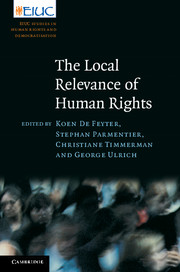Book contents
- Frontmatter
- Contents
- Contributors
- Series editors' preface
- Preface
- Abbreviations
- 1 Introduction: reconsidering human rights from below
- 2 Sites of rights resistance
- 3 Freedom from want revisited from a local perspective: evolution and challenges ahead
- 4 Relevance of human rights in the glocal space of politics: how to enlarge democratic practice beyond state boundaries and build up a peaceful world order
- 5 The local relevance of human rights: a methodological approach
- 6 Ensuring compliance with decisions by international and regional human rights bodies: the case of the European Committee for the Prevention of Torture
- 7 Building rights-based health movements: lessons from the Peruvian experience
- 8 Defining human rights when economic interests are high: the case of the western Shoshone
- 9 Struggling to localise human rights: the experience of indigenous peoples in Chile
- 10 Enforcing environmental rights under Nigeria's 1999 Constitution: the localisation of human rights in the Niger Delta region
- 11 Conflict resolution through cultural rights and cultural wrongs: the Kosovo example
- 12 Epilogue: widening the perspective on the local relevance of human rights
- Index
- References
12 - Epilogue: widening the perspective on the local relevance of human rights
Published online by Cambridge University Press: 07 October 2011
- Frontmatter
- Contents
- Contributors
- Series editors' preface
- Preface
- Abbreviations
- 1 Introduction: reconsidering human rights from below
- 2 Sites of rights resistance
- 3 Freedom from want revisited from a local perspective: evolution and challenges ahead
- 4 Relevance of human rights in the glocal space of politics: how to enlarge democratic practice beyond state boundaries and build up a peaceful world order
- 5 The local relevance of human rights: a methodological approach
- 6 Ensuring compliance with decisions by international and regional human rights bodies: the case of the European Committee for the Prevention of Torture
- 7 Building rights-based health movements: lessons from the Peruvian experience
- 8 Defining human rights when economic interests are high: the case of the western Shoshone
- 9 Struggling to localise human rights: the experience of indigenous peoples in Chile
- 10 Enforcing environmental rights under Nigeria's 1999 Constitution: the localisation of human rights in the Niger Delta region
- 11 Conflict resolution through cultural rights and cultural wrongs: the Kosovo example
- 12 Epilogue: widening the perspective on the local relevance of human rights
- Index
- References
Summary
The question concerning the local relevance of human rights can be approached from different angles. The contributors to the present volume predominantly focus on the prospects for mobilising human rights from below in order to effect social change. They do this both in theoretical terms and through case studies, or a combination of both. Some authors focus on the underlying notion of localisation and the challenges facing human rights in the context of globalisation. Others analyse the factors that render community-based human rights campaigns successful or unsuccessful, the importance of economic, social and cultural rights for advancing social justice and integration, and the question of how to overcome the ‘implementation gap’ between rhetoric and reality. Other authors in turn present concrete accounts, rich in detail and complexity, of struggles to realise rights in different parts of the world.
Looking at the manuscript as a whole, it provides an innovative and coherent account of the importance of localising human rights as well as specific ways of going about this. A primary aim of my epilogue is to reconstruct the main elements of this overall position. Before turning to this, however, I wish to draw attention to another approach to localising human rights, which is not so well developed in the present publication yet in my view equally important. This has to do with building a human rights perspective into public policy making and administrative procedures at all levels of governance as well as in institutional settings that are not directly associated with human rights. I shall begin by presenting a case related to a law reform process in Tanzania in which I was peripherally involved in the late 1990s and which illustrates what is at stake in this complementary approach to the localisation of human rights.
- Type
- Chapter
- Information
- The Local Relevance of Human Rights , pp. 337 - 360Publisher: Cambridge University PressPrint publication year: 2011
References
- 5
- Cited by



